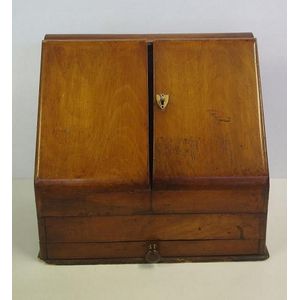Charles Frodsham Marine Chronometer, 1858
You must be a subscriber, and be logged in to view price and dealer details.
Subscribe Now to view actual auction price for this item
When you subscribe, you have the option of setting the currency in which to display prices to $Au, $US, $NZ or Stg.
- Mahogany - Mahogany is a dense, close grained red-coloured timber from the West Indies and Central America. It was first imported into Europe in the the early 18th century and its use continued through the 19th century. It was popular for furniture making because of its strength, the wide boards available, the distinctive grain on some boards, termed flame mahogany and the rich warm colour of the timber when it was polished.. The "flame" was produced where a limb grew out from the trunk of the tree, and this timber was usually sliced into veneers for feature panels on doors, backs and cornices.
Some terms used to describe mahogany relate to the country from which it originally came, such as "Cuban" mahogany, "Honduras" mahogany etc. However unless the wood has been tested the names assigned are more a selling feature, rather than a true indication of the timber's origin. - Gimbal - On a ship, a gimbal is a pivoted mounting for the compass, clock, chronometer, stoves, drink holders and other equipment which keeps the item horizontal, no matter which way the vessel is leaning.
- Ivory - Ivory is a hard white material that comes from the tusks of elephants, mammoth, walrus and boar, or from the teeth of hippopotamus and whales. The ivory from the African elephant is the most prized source of ivory. Although the mammoth is extinct, tusks are still being unearthed in Russia and offered for sale.
Ivory has been used since the earliest times as a material for sculpture of small items, both in Europe and the east, principally China and Japan.
In Asia ivory has been carved for netsuke, seals, okimono, card cases, fan supports, animals and other figures and even as carved tusks.
In the last 200 years in Europe ivory has been used to carve figures, for elaborate tankards, snuff boxes, cane handles, embroidery and sewing accessories, in jewellery and as inlay on furniture. Its more practical uses include being used for billiard balls, buttons, and a veneers on the top of piano keys.
The use and trade of elephant ivory have become controversial because they have contributed to Due to the decline in elephant populations because of the trade in ivory, the Asian elephant was placed on Appendix One of the Convention on International Trade in Endangered Species (CITES), in 1975, and in January 1990, the African elephant was similarly listed. Under Appendix One, international trade in Asian or African elephant ivory between member countries is forbidden. Unlike trade in elephant tusks, trade in mammoth tusks is legal.
Since the invention of plastics, there have been many attempts to create an artificial ivory - Timepiece - In today's usage, the word "clock" is the name given to any instrument used for measuring time, but the word clock is derived from the Celtic word meaning "bell", and traditionally a clock without a bell or chime was known as a timepiece.
This item has been included into following indexes:
Visually similar items

Antique desk compendium with inside filing sleeves & calendar and a lower shallow drawer, 77.5 cm wide (when open)

Vintage pine 2 door bookcase with adjustable shelves, on squat cabriole legs, 107 cm wide, 31.5 cm deep, 119 cm high

Sterling silver multi-strand necklace marked sterling

A Chinese earthenware Compressed globular jar, Warring States, 475-221BC with deeply impressed geometric designs and applied with four slender dragons on the shoulder. Provenance: Private Collection of a gentleman. Height 12 cm. Diameter 20 cm
